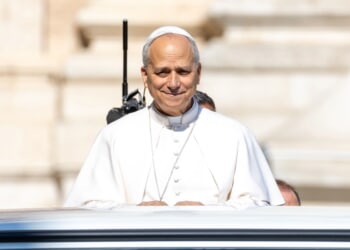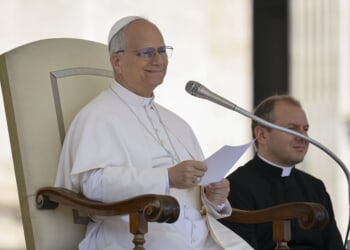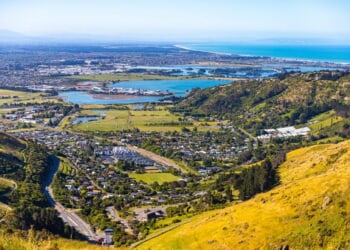John Oxley is a consultant, writer, and broadcaster. His SubStack is Joxley Writes.
Until recently, the Conservatives need not have concerned themselves with the outcome of the Green Party leadership election. The news would have been a footnote on these pages, a titbit for the obsessives to keep track of.
Yet in our electoral doldrums, and the new, more volatile flow of voters, the position of the Greens makes a difference to us. More than that, yesterday’s election of Zack Polanski may have been a rare, good break for the Tories.
From their roots in the 1970s ecology movement, the Greens have had a long grind towards political relevance. The limitations of the first-past-the-post system held them back while their European cousins gained ground. Now they are a rising force; last year, they picked up four MPs, and with Labour faltering, their ambitions are building. Polanski arrives with the expectation of making good on those ambitions.
Like any minor party, the Greens have benefited from a strategic ambiguity about what they actually stand for. They have pitched themselves as a party of opposition to whoever happens to have the upper hand locally. In urban centres, they compete with Labour for left-wing votes; in the shires and suburbs, they downplay their leftwing economics and focus on NIMBYism and local green spaces.
A woolly approach to party discipline has enhanced this: rejecting the idea of party whips, and, until now, an odd “co-leader” set-up. The party ran with the outsider idea of being all things to all people.
In 2024, this worked well for them. They increased their vote share and won four seats. There was, however, strikingly little about those seats that hung together. Brighton Pavilion and Bristol Central matched the hackneyed stereotypes of Green voters: affluent, big city social liberals. The other two were more surprising. North Herefordshire and Waveney Valley were historically solid rural Tory seats. Both, however, flipped Green.
Each was driven by local ecological issues (the River Wye and pylons) and general dissatisfaction with the then government. But it was facilitated by many Conservative-leaning voters being happy to vote Green. These patterns have been repeated at the local level, too. Greens have poached some of the most urban, liberal council wards after decades of Labour control. They won against long-standing Tories in places like Suffolk and Surrey.
The result is a confused party, saying different things in different places to different people. It is a strategy that works for minor parties, but as others have found, at a certain moment, you have to pick a side beyond being simply “local opposition”. The election of the new leadership is such a moment.
There is no doubt as to which side of the party Polanski is from. Despite his background in the Liberal Democrats, he is now a loudly proclaimed “eco-populist”, tying his green credentials to demonstrably left-wing economics. Through the campaign, his slick videos pushed this, attacking the rich and defending migrants in a class-war-infused juxtaposition.
There is much in there that should make wavering Conservatives gasp. Polanski’s vision is high-tax, anti-NATO, pro-nationalisation. Electing him is a clear choice from the Greens of who they want to appeal to and where they want to fight.
Under Polanski, the Greens will be looking to do with Labour from the left what UKIP and Reform did to us from the right. They are going to push nakedly populist talking points, drawing away left-wing votes in urban areas in the hope that either they win enough seats to be part of a Labour-led coalition, or that their very presence will pull Labour leftwards.
In short, they will turn away from Tory-leaning areas to focus on the urban ones where they can displace Labour. It is a strategy that makes sense in these times, but one that willingly sacrifices a chunk of voters they had already managed to court.
The opportunity here is for the Conservatives to win some of them back. The voters in more rural, richer constituencies and councils should understand the Greens have turned from them. They are likely to be the targets, rather than the beneficiaries, of a high-tax economic agenda.
Equally, the Greens are now likely to pursue their liberal social aims more prominently and proudly. Put bluntly, the party is going to feel a lot more like Bristol than Hereford. If the Greens are choosing left, we should, once again, be able to pick up those voters on the right.
Winning back Green seats may not be the most pressing or biggest challenge for the party, but it still matters. Getting dislodged in your heartlands by any party is bad; it sucks away seats and resources that you need as part of the rebuild. Winning back Herefordshire and Waveney will not be enough to restore the party to power, but it must be an essential part of it. The same goes for the councils that have swung Green. It is far easier to win back places you once held than open new fronts.
These voters should be winnable. After all, many of them were amenable to supporting Tory, but were put off by the failures of the last 14 years. That they went Green gives us an inkling of what they tend to care about – conservation issues, especially when they collide with local politics.
This provides us with a way to win them back, focusing on issues like water and air quality, as well as sustainability. These have the advantage of being points where the party has a defensible record from 14 years in power, and which are also broadly popular with the broader electorate.
These switchers might not seem like a major priority, but they serve as a valuable marker for the party. To return to electoral credibility, the Conservatives need to be able to pick off voters and seats who have moved in all directions.
If we cannot win back these, where the new party has turned away from them, there is little hope for a wider electoral recovery. To do the tricky bits of recovery, we need to demonstrate we can do the easy bits, and pulling back these true blue constituencies from the Greens should be part of that.
One day, we might return to the luxury of ignoring the leadership moves of Britain’s fourth or fifth political party. But for now we should be thankful for the rise of Polanski. He may stand for everything we distrust, but that is a gift for us. He will be fighting alongside the emergent Corbyn/Sultana outfit to peel off voters from Labour’s left, and will go in a direction which pulls away from the Tory shires.
This should give us some impetus on the road to recovery. As ever, though, the value of that opportunity depends on our ability to exploit it.





![Gavin Newsom Threatens to 'Punch These Sons of B*thces in the Mouth' [WATCH]](https://www.right2024.com/wp-content/uploads/2025/08/Gavin-Newsom-Threatens-to-Punch-These-Sons-of-Bthces-in-350x250.jpg)
![ICE Arrests Illegal Alien Influencer During Her Livestream in Los Angeles: ‘You Bet We Did’ [WATCH]](https://www.right2024.com/wp-content/uploads/2025/08/ICE-Arrests-Illegal-Alien-Influencer-During-Her-Livestream-in-Los-350x250.jpg)
![Black BET Billionaire Donor Stuns Democrats, Gives $500K to Winsome Earle-Sears [WATCH]](https://www.right2024.com/wp-content/uploads/2025/08/Black-BET-Billionaire-Donor-Stuns-Democrats-Gives-500K-to-Winsome-350x250.jpg)






